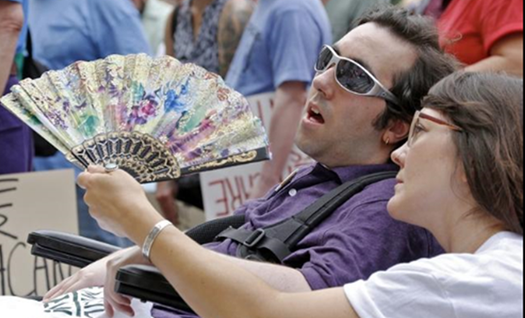Over the past 28 years, Kim Kelly has worked with more than 150 different disability-services providers – some for months or years, many only briefly — to cover the 24-hour care her son needs. And Kelly is again looking to hire.
“The fact that you can’t get providers right now is burning out a lot of families,” she said. “I’m doing between six and eight overnights every month; Joe’s dad is here pretty much around the clock. We know providers are out there, but reaching them is a problem.”
The Franklin County Board of Developmental Disabilities is hopeful that a pilot program launched this summer will make it easier for families to find certified home-and community-based providers interested in serving them. Dubbed “The Connector,” the effort began in June and quickly drew responses.
“We know that finding providers is a consistent problem, and the workforce crisis has sort of exacerbated it,” FCBDD Superintendent/CEO Jed Morison said. “We wanted to try something specific to Franklin County.”
Although federal conflict-of-interest rules prohibit FCBDD staff from telling families which providers to choose, the county board can help link people with developmental disabilities to the agencies or independent providers best able to meet their needs.
To use The Connector, an individual, family member or guardian completes a profile of the person in need of services and submits it to FCBDD. Providers who want to be included in The Connector also fill out profiles.
Whenever FCBDD receives a request from a person in need of services, administrative staff member Joni Sparks sends the profile of the person looking for help to participating providers. Providers have seven days to express interest; families receive the list of responding providers (along with their profiles) and can then arrange interviews.
“I’m sure it’s very frustrating for families and for counties, because agencies right now aren’t taking on a lot of new cases due to staffing,” said Sara Eppard, Ohio director for the support-services agency Dungarvin. “Sometimes I actually tell families, ‘You might be better off going with an independent provider.’ The question often is, ‘How do we do that?’ I think this could be really good for them.”
Relatively low wages and high rates of employee turnover have long plagued the disability-services industry. Recruitment became even more difficult during the pandemic. “It’s scary,” Eppard said. “We are fortunate that we’re a larger provider, but we are struggling financially because of overtime and other challenges.”
FCBDD also is working to develop an online portal akin to The Connector that could be used by both families and providers. Previous efforts by FCBDD, including one patterned after Angie’s List, didn’t take off. And advocates say the state’s online Provider Guide Plus isn’t broadly popular.
Kelly, who also serves on a Workforce Crisis Task Force through the Ohio Department of Developmental Disabilities, said many families are desperate for help. It can be especially difficult to obtain nurses and caregivers to serve people like her 33-year-old son, Joe Lavalle, whose needs are complex.
Kelly became a paid provider for Joe through the agency I Am Boundless so that she can schedule and manage his in-home care. She hopes that nursing services can be added to The Connector, too. “I’m always thinking of Joe, but I want to be helpful for others,” she said of her advocacy. “If I’m getting it done for him, I’m getting it done for everyone else like him.”
Click here for information about The Connector and provider selection, or email Joni Sparks at [email protected]


